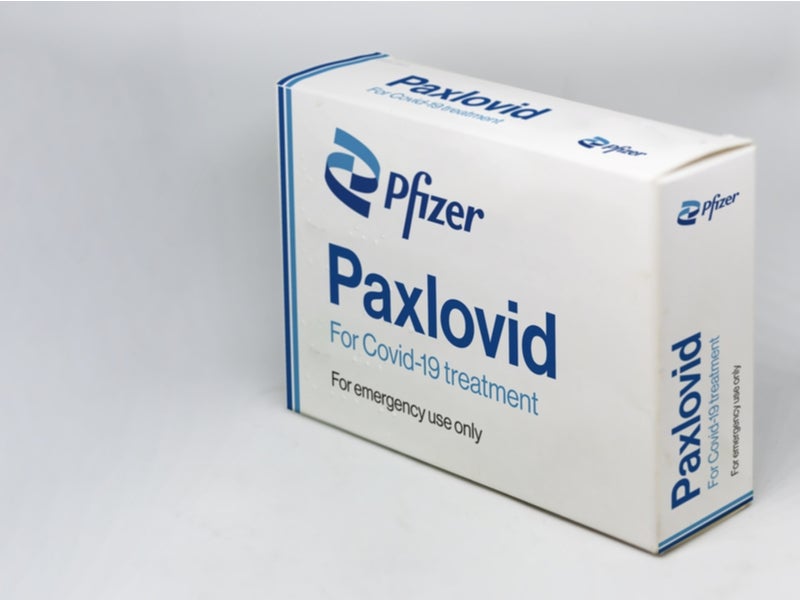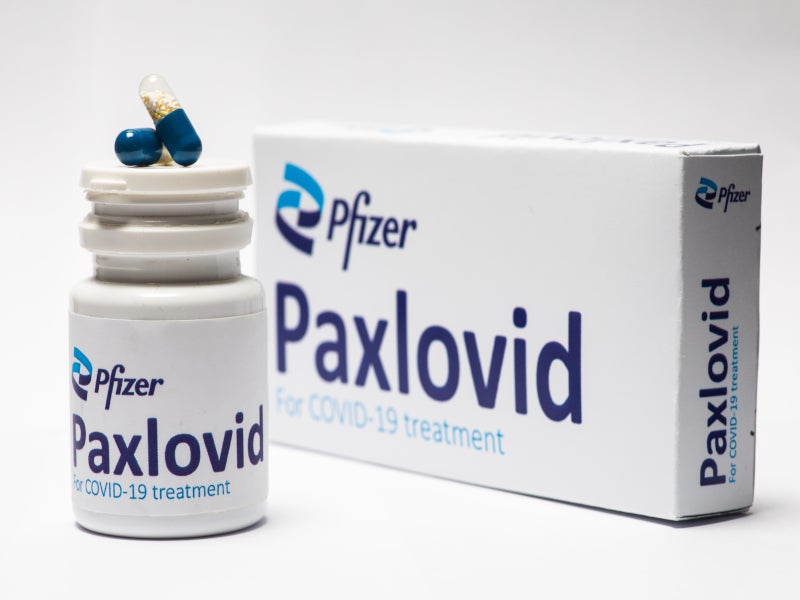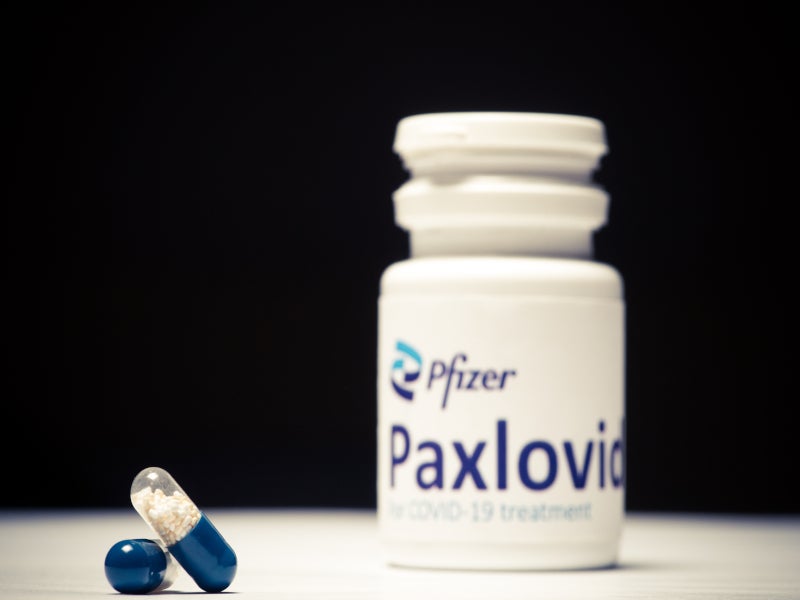Paxlovid is a ritonavir-boosted nirmatrelvir drug indicated for the treatment of mild to moderate Covid-19 in patients aged 12 years and older who are at high risk of progressing to severe Covid-19, including hospitalisation or death.
Developed by US-based pharmaceutical firm Pfizer, Paxlovid is available as nirmatrelvir tablets co-packaged with ritonavir tablets for oral co-administration. Nirmatrelvir is available as pink-coloured, oval, immediate-release, film-coated tablets, while ritonavir is supplied as white film-coated ovaloid tablets.
Nirmatrelvir is a novel main protease (Mpro) inhibitor developed by Pfizer to block the SARS-CoV-2 Mpro enzyme activity. Meanwhile, ritonavir is an antiretroviral protease inhibitor and a strong cytochrome P450 (CYP) 3A inhibitor that improves the exposure of nirmatrelvir to an effective level against SARS-CoV-2.
Pfizer collaborated with XtalPi, a technology company specialising in artificial intelligence and robotics, to validate the drug’s crystal structure. XtalPi’s digital prediction algorithm and computational models were employed to confirm the stability of the crystal structure and affirm its suitability for large-scale production and manufacturing.
Paxlovid was developed in a solid form to facilitate ease of storage and transportation, thus allowing patients to self-administer the medication, which improved treatment adherence and also alleviated the burden on healthcare systems amid the Covid-19 pandemic. Pfizer delivered 20 million treatment courses of Paxlovid to the US Government as of December 2022 to combat Covid-19.
Paxlovid is currently authorised for conditional or emergency use in approximately 70 countries for Covid-19 patients at high risk of serious illness.
Regulatory approvals for Paxlovid
In December 2021, the US Food and Drug Administration (FDA) authorised Paxlovid for emergency use in high-risk adult and paediatric patients with mild to moderate Covid-19.
In the same month, the European Medicines Agency’s (EMA) Committee for Medicinal Products for Human Use (CHMP) also recommended the use of Paxlovid for the treatment of Covid-19 patients who do not require supplemental oxygen and are at greater risk of progressing to severe illness. The drug is authorised for use in the European Union.
Pfizer submitted a new drug application (NDA) to the FDA for full regulatory approval in June 2022.
In May 2023, the FDA approved Paxlovid for the treatment of mild-to-moderate Covid-19 in adults with an increased risk of progressing to severe illness, including hospitalisation or death. It is the fourth drug and first antiviral oral therapy approved by the FDA to treat Covid-19 in adults.
Covid-19 causes and symptoms
Covid-19 is a viral infection caused by the SARS-CoV-2 virus. It can affect an individual’s upper respiratory tract (sinuses, nose and throat) or lower respiratory tract (windpipe and lungs).
The virus can spread from an infected individual’s mouth or nose in the form of microscopic droplets when the person coughs, sneezes, speaks, sings or breathes.
Symptoms of Covid-19 include fever, cough, body ache, shortness of breath, chills, runny nose, nausea, loss of smell or taste, sore throat and diarrhoea.
Paxlovid’s mechanism of action
Paxlovid is a specially designed SARS-CoV-2-3CL protease inhibitor, which contains nirmatrelvir and ritonavir. Nirmatrelvir is a peptidomimetic inhibitor of the SARS-CoV-2 Mpro, also known as 3CLpro or nsp5 protease while ritonavir is an HIV-1 protease inhibitor that is inactive against SARS-CoV-2 Mpro.
Nirmatrelvir binds directly to the SARS-CoV-2 Mpro active site and inhibits the coronavirus’ viral replication process while ritonavir increases nirmatrelvir’s plasma concentrations by inhibiting its CYP3A-mediated metabolism. Ritonavir helps to slow down the breakdown of nirmatrelvir, allowing it to remain active in the body for a longer time at higher concentrations to help fight the virus.
Clinical trials on Paxlovid
The FDA’s emergency use authorisation (EUA) for Pfizer’s Paxlovid was based on the results of EPIC-HR (Evaluation of Protease Inhibition for Covid-19 in High-Risk Patients), a Phase II/III, randomised, double-blind, placebo-controlled clinical study.
In the study, 2,246 non-hospitalised symptomatic adult patients with confirmed SARS-CoV-2 infection were randomly assigned to orally receive either Paxlovid (300mg/100mg) or a placebo every 12 hours for five days. The patients enrolled in the study had not received a Covid-19 vaccination and had not been previously infected with Covid-19.
The trial’s primary endpoint was the proportion of patients who had been hospitalised due to Covid-19 or died for any reason during the 28-day follow-up period.
Paxlovid reduced the risk of Covid-19-related hospitalisation or death from any cause by 89% in patients within three days of symptom onset and 88% within five days of symptom onset compared with placebo. No patient treated with Paxlovid died by day 28, compared with nine deaths in the placebo group. The drug’s safety and efficacy profile in treating Covid-19 is still being investigated.
Possible side effects of Paxlovid treatment include loss of taste, diarrhoea, high blood pressure and muscular pains.
The approval was further supported by another Phase II/III clinical trial called EPIC-SR (Evaluation of Protease Inhibition for Covid-19 in Standard-Risk Patients). The study demonstrated a decrease in the number of hospitalisations or deaths related to Covid-19, up to Day 28, among a subset of adults aged 18 and above. The group consisted of non-hospitalised individuals with confirmed Covid-19, who were fully vaccinated and had at least one risk factor for the development of severe disease.





